Driving in Dubai can be pretty intimidating at first. So is it easy to drive in Dubai? Well, if you get the hang of the road rules, use the right tools, and just blend in a bit with the local driving style, then yes – it’s a breeze. This driving guide is going to give you the lowdown on speed limits, speed cameras, toll gates, car rentals, and all the safety measures you need to drive confidently in Dubai.
The Honest Answer: Is it Easy to Drive in Dubai?
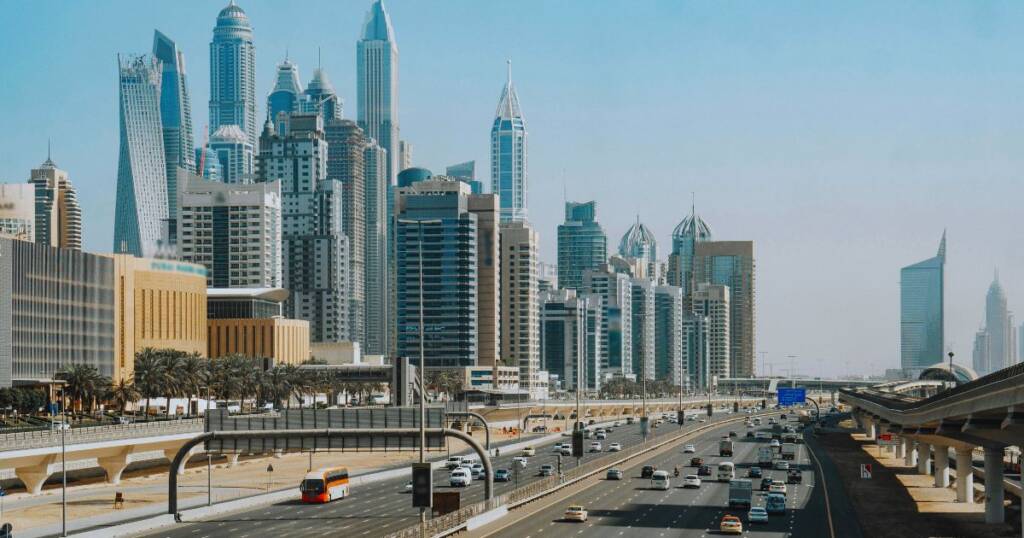
- I mean for a confident driver who knows what they’re doing and follows the traffic lights and doesn’t cut corners (no pun intended), driving in Dubai is straightforward to say the least.
- The good news: Dubai’s got modern roads, clear signs in English and Arabic, speed limits you can actually keep track of, and great navigation via Google maps.
- The bad news: it’s a big city, things can get a bit hectic, there are some pretty strict traffic laws to keep an eye on, and of course the usual traffic congestion you get in big cities like around the Mall and Dubai Marina.
Featured Snippet Tips:
- Just a little reminder: if you’re overtaking, stick to the left lane – it’s the fast lane, after all.
- Follow the traffic lights, keep a safe distance and use your blinkers (or indicators) like a pro.
- Watch out for those speed cameras and changing speed limits – it’s easy to get caught out.
- Don’t forget to carry a valid driving license or international driving permit – you don’t want to get caught short.
Who Can Legally Drive in Dubai? What You Need to Know
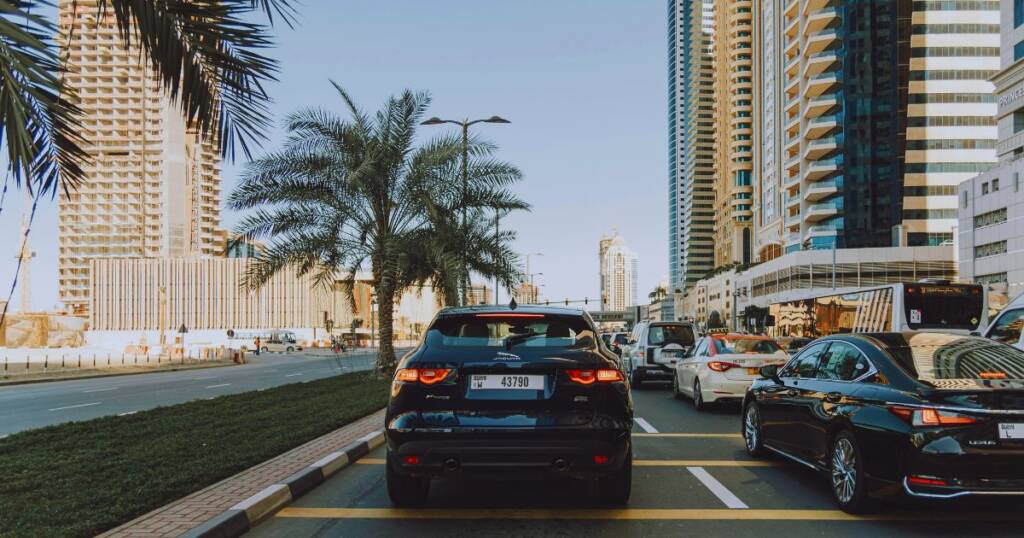
The Legal Stuff: Driving Age, Min Age, and Licence Rules
- So the legal driving age in the UAE is 18 – that’s the magic number for getting behind the wheel of a car.
- And when it comes to renting a car, the minimum age is usually 21-25 – it depends on the rental company, but younger drivers may have to pay a bit extra.
- If you’re from a country that’s on the approved list, you can use your original driving license to drive in Dubai – if not, you’ll need an international driving permit (IDP) on top of your license.
The Important Docs to Carry
- Passport and visa (obviously).
- Driver’s license and if you need it, your international driving permit.
- Rental car agreement and all the basic insurance details.
- And a good idea is to have your rental car company’s emergency contact number handy.
Zero Tolerance and the Key Dubai Traffic Laws
- There’s no messing around with drink driving in Dubai – zero tolerance.
- No using your phone while driving unless you’ve got a hands-free system.
- And of course seat belts are a must for all passengers, and kids need their own seats.
- Running a red light? That’s a big no-no and will get you in serious trouble.
- If you need to check your fines or file a non-emergency report, you can use the Dubai Police app – very handy.
Authoritative Sources:
- Dubai Police: https://www.dubaipolice.gov.ae/
- RTA Dubai: https://www.rta.ae/
The Lay of the Land: Dubai’s Roads and Road Culture
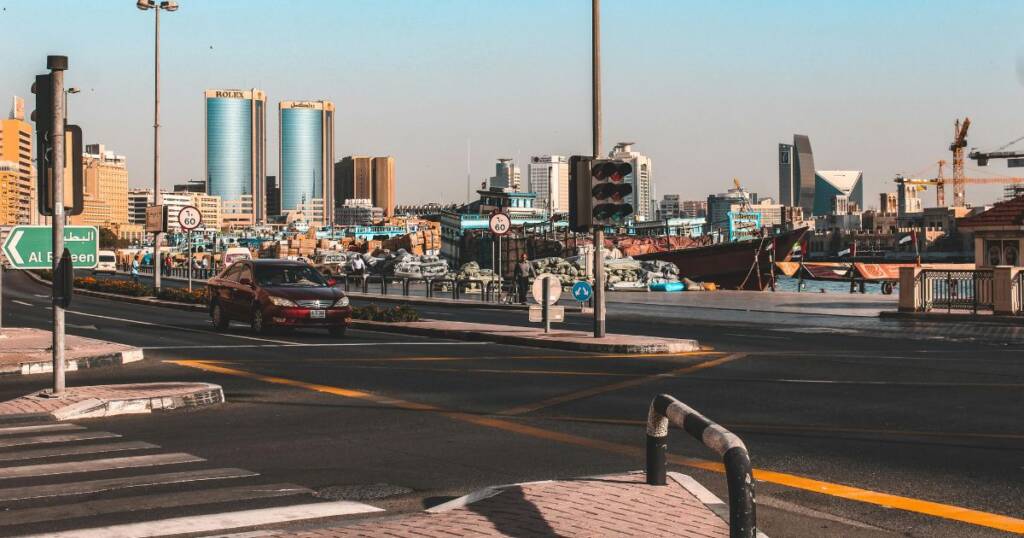
How Dubai’s Road Networks Are Laid Out
Dubai’s got some top-notch roads with numbered routes (E11, E44), loads of cloverleaf interchanges and bilingual signs to boot. Sheikh Zayed Road (E11) is the main north-south route, and you’ll find yourself hearing directions like “head south on E11” or “take Exit 50 towards Dubai Marina” all the time.
Left Lane vs Right Lane: Lane Discipline
- The left lane is the fast lane, so use it to overtake and avoid holding up other drivers.
- Stick to the right lane or middle lanes and only move to the left to pass.
- And do keep a safe distance – tailgating is a major no-no in Dubai.
Driving Etiquette and Other Drivers
Driving in Dubai is a big-city affair, and things can get pretty hectic. Many drivers have come from other countries (South Korea, India, the UK and more) so road manners can vary a bit. Some drivers can be a bit aggressive, but if you drive sensibly and follow the rules, you should be okay.
Traffic Signals and Road Rules to Keep In Mind
- Always follow the traffic lights – no sneaking a right turn on red unless it’s allowed.
- Pedestrian crossings are sacred, so give way and respect other road users.
- Use your indicators – especially before changing lanes.
Speed Limits, Speed Cameras, and Fines
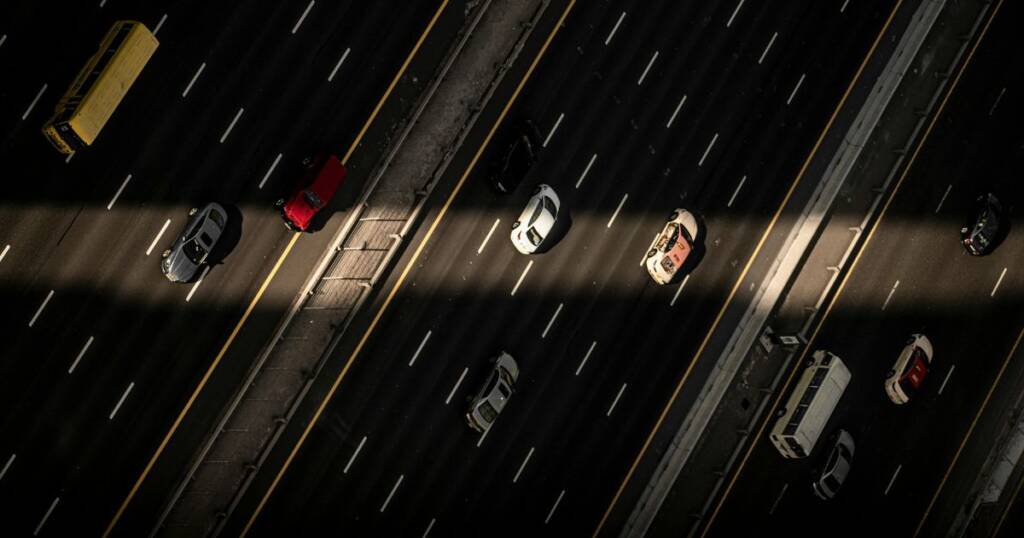
Speed Limits on Dubai’s Roads
| Road type | Typical speed limit (km/h) | Notes |
| Residential streets | 30–40 | Watch for pedestrians and speed humps. |
| Urban arterials | 60–80 | Frequent signals and cameras. |
| Dubai highways (e.g., E11) | 100–120 | Variable; posted signs prevail. |
| School/special zones | 30–40 | Strict; expect cameras and fines. |
Dubai’s got fixed and mobile cameras, including some average-speed sections. If you get caught speeding, the fine will be automatically added to your rental car bill. You can check and pay fines on the Dubai Police app or RTA channels.
How to Stay On the Right Side of the Law
- Use Google Maps or Waze to get alerts about changing speed limits.
- Slow down in bad weather or construction zones.
- Get ready to slow down before toll gates or exits.
Navigation and Parking: Google Maps, Signs, Toll Gates and More
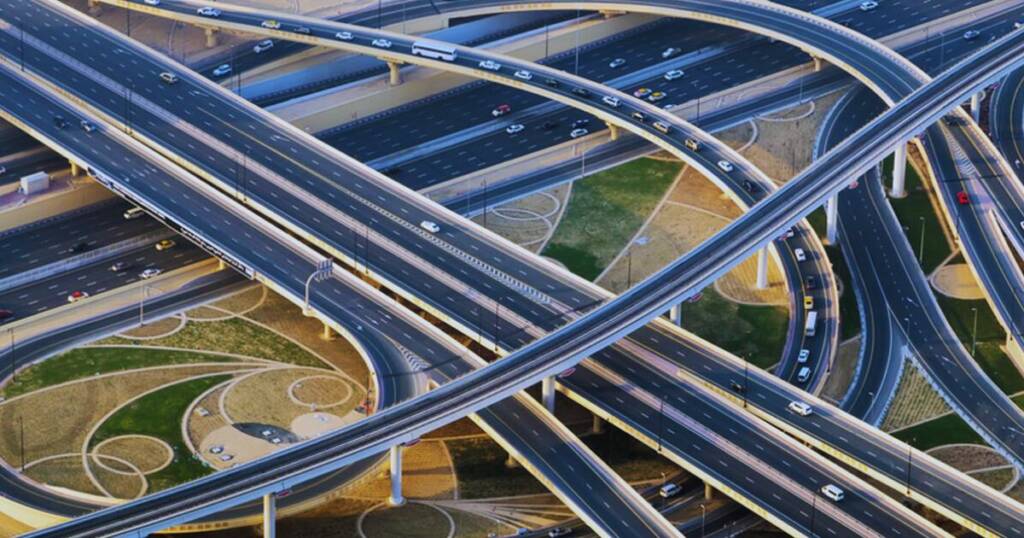
Using Google Maps and In-Car Nav
- Google Maps is a lifesaver for navigating Dubai, but don’t rely on it too much – keep an eye out for signs and road markings too. Google Maps is an incredibly reliable tool for getting a live sense of traffic, understanding which lane you’re meant to be in, and knowing when you’ll arrive at your destination. It even picks up on landmarks like Dubai Mall and Dubai Marina. To navigate safely, keep your route on-screen and pay attention to the steering wheel controls for voice prompts – that way you can keep your eyes on the road while still getting the guidance you need.
Toll gates (Salik) and how they work
- Dubai’s got its Salik toll gates all over the place, with automatic number-plate charging.
- If you’ve hired a car, chances are it’s pre-tagged with a Salik pass, so you won’t need to do a thing – your rental car company will sort the bill, possibly with a small admin fee added on top.
Parking basics
- Street parking is paid for via meters or the RTA app, which can get a bit tricky to navigate if this is your first time driving in Dubai.
- If you’re heading to the mall, most will have structured parking but Dubai Mall is usually free for a few hours.
- Find out about free parking in Dubai.
Fueling up
- Petrol stations are pretty much everywhere, usually with mini-marts and car wash on site. They mostly accept cards and mobile payments, so no worries about cash.
- If you’re driving out to the desert, plan your fuel stops in advance, as things can get a bit sparse out in the desert.
Car rentals in Dubai: choosing a rental company and insurance

How to pick a rental company and what to look for in a rental car
- Do your research and compare the rental companies in Dubai – take a look at their ratings, mileage limits, deposits, and what they cover with Salik. At DRC we offer reliability, advice and security.
- Economy rental cars are great for nipping around the city, but if you’re looking for a bit of luxury, we’ve got sports cars and even 4x4s for rent.
Insurance: what’s basic cover and what do you need to upgrade
- Basic insurance usually just covers third-party liability and has a deductible.
- If you want to make sure you’re not left out of pocket, consider adding CDW/SLI.
- In the unlikely event of an accident, you’ll need a police report to make a claim – without it, you’ll probably have to pay for the damages upfront.
What to do when you pick up your rental car
- Take a minute to document any existing damage on your rental car, check the spare tire and tools are in good nick, and jot down the emergency contact number for your rental company.
- Ask how they handle speeding fines and Salik tolls if you’re pulled over.
- Also double check the fuel policy and any additional driver rules – you don’t want to get caught out halfway through your rental.
Safety measures and emergency steps
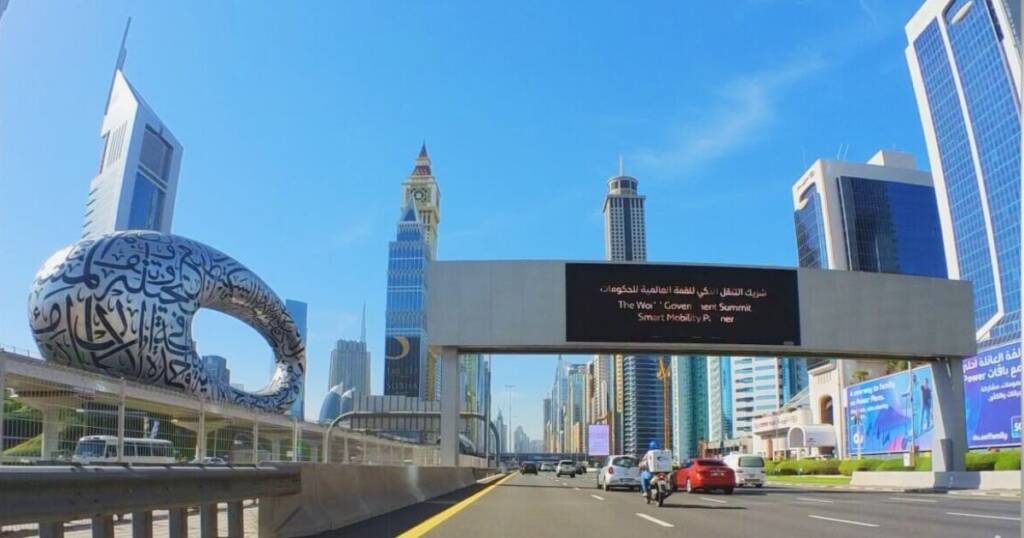
What to do in the event of an accident
- If you’re in a minor accident, try to move to a safe spot if possible.
- Give Dubai Police a call on 999 (you’ll need a police report to make an insurance claim) and take a few photos of the damage for your records.
- Inform your rental car company as soon as possible.
Emergency vehicles and contacts
- Always give way to emergency vehicles – giving them a clear run is the right thing to do.
- You can reach Dubai Police on 999, the ambulance on 998 and the fire service on 997.
- If you’re unlucky enough to need to file a police report digitally, the Dubai Police app can help you out.
Common routes and places first-time drivers visit
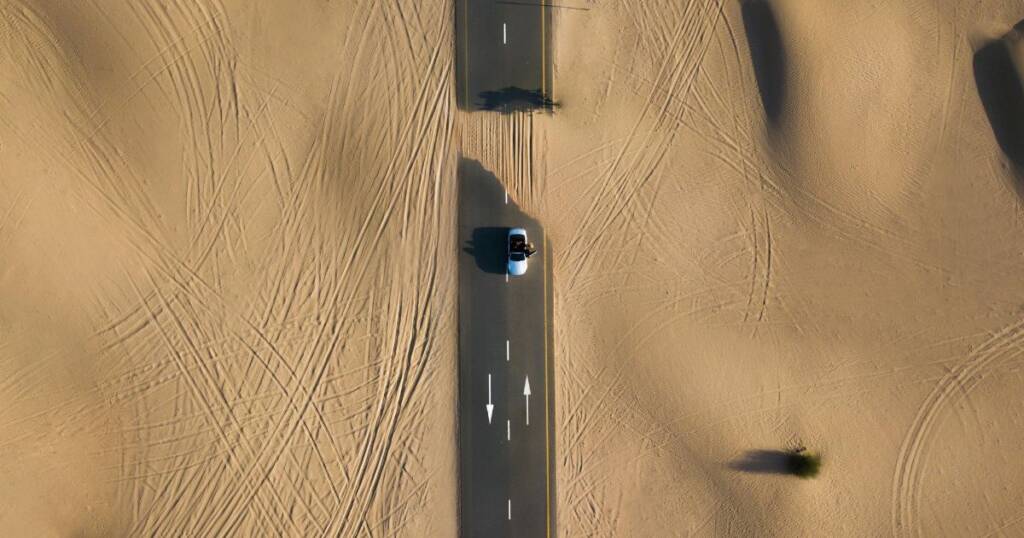
Sheikh Zayed Road (E11)
- This busy multi-lane artery is a real test of your driving skills – keep to the right unless overtaking and always use the right lane unless you’re planning to drive off at one of the many exits.
- Keep an eye out for the exit-only lanes and merge early to avoid any last-minute swerves.
Driving to popular attractions
- If you’re heading to the Dubai Mall, it’s a pretty straightforward affair with clear signage and relatively easy parking (although it’s busiest during peak hours).
- Dubai Marina is a more complicated affair – watch out for pedestrian crossings and be mindful of the narrow street.
- If you’re heading to the beach, don’t expect to park right on the sand – it’s usually pretty busy on the weekends.
Short road trips and the Dubai desert
- Al Qudra Lakes is a great spot for a quick weekend getaway – the roads are paved for most of the way and the scenery is pretty breathtaking.
- If you’re planning on taking your rental car off-road in the dunes, make sure you get proper training and take a few essentials like water and recovery gear.
- If you’re planning a longer trip to the desert, don’t forget to check the petrol stations before you leave the city limits.
Dubai traffic laws and penalties to watch out for
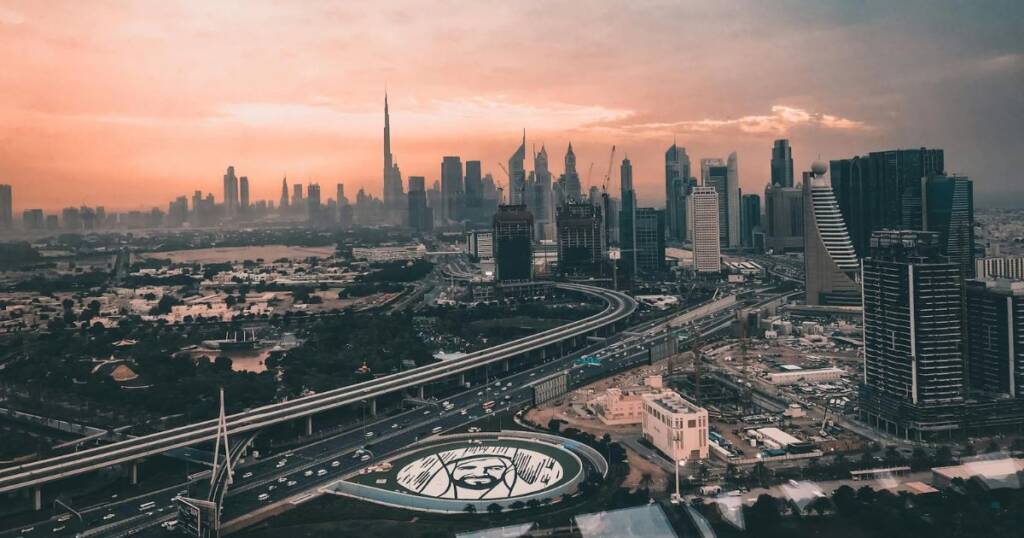
Common traffic violations that catch first-time drivers out
- Speeding, running a red light and tailgating are all pretty serious infractions that can land you with a hefty fine.
- Abrupt lane changes and blocking pedestrian crossings are other no-nos.
- Don’t be tempted to try and outsmart the system – these fines can even lead to black points on your record or have your rental car impounded.
What happens if you get a fine on a rental car
- The rental company will be notified and will charge your card, possibly with a small admin fee on top.
- If you need to dispute the fine, you can do so through the Dubai Police app.
Frequently asked questions: is it easy to drive in Dubai?
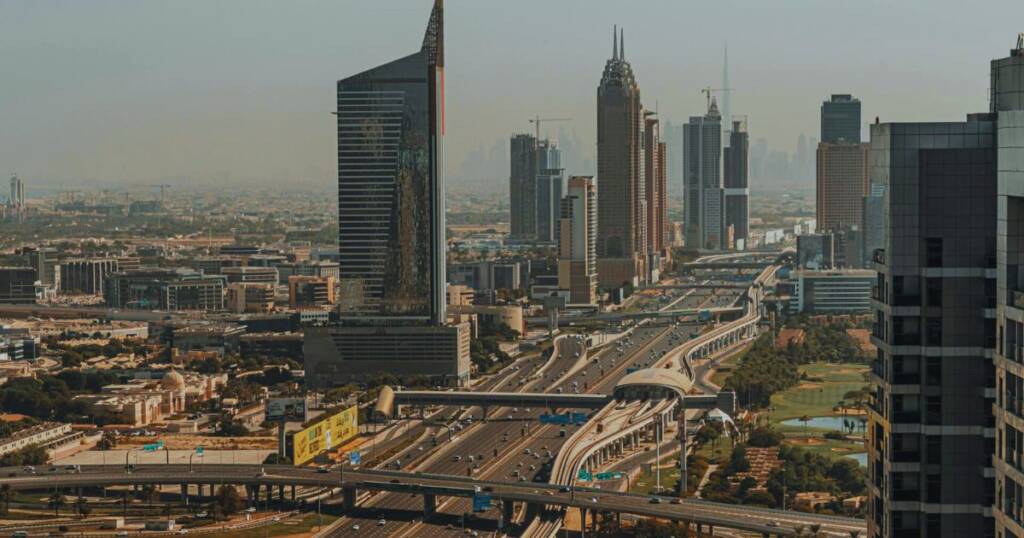
Is it easy to drive in Dubai at night?
Not really any harder than at any other time to be honest. Major roads are well lit, and if you stick to the speed limit and stay focused you’ll be fine. Just be prepared for some other drivers to drive a bit more aggressively than you might be used to at night.
Do I need an international driving permit in Dubai?
If your driving license is from abroad and not on the list of approved countries – yes you will need to get an international driving permit too. And make sure you bring both permits with you when you drive.
How old do I have to be to drive in Dubai?
18 – that’s the minimum age to drive a car. If you want to rent a car, most rental companies wont let you till you’re a bit older – usually 21 or 25.
Which side is the steering wheel on in Dubai? And which lane do we drive in?
Steering wheels are on the left – so you drive on the right hand side of the road. The left hand lane is for overtaking – not for driving in.
Do rental cars pay for tolls automatically?
Yes they do – Salik toll gates will automatically charge your rental car. The fees will show up on your rental company invoice later.
What app is good for checking fines or incident reports?
The Dubai Police app is the one to download – it can help you check for fines, get a police report, or find out what’s happening with the traffic.
What should I do if I have a minor accident?
First off – get to a safe place if you possibly can – then ring Dubai Police, get a police report, document the damage, and let the rental company know.
Are there lots of speed cameras in Dubai?
Yes – there are speed cameras on highways and main roads all over the city. So just make sure you’re sticking to the speed limit – its better for your wallet, and your driving record.
Can I use my mobile while driving?
You can – as long as you’re using a hands-free system. Otherwise its not allowed – and you might get a fine.
Is parking free at Dubai Mall?
Parking is usually free for a few hours – but its a good idea to keep an eye on the signs – things can change.
The verdict: is it easy to drive in Dubai?
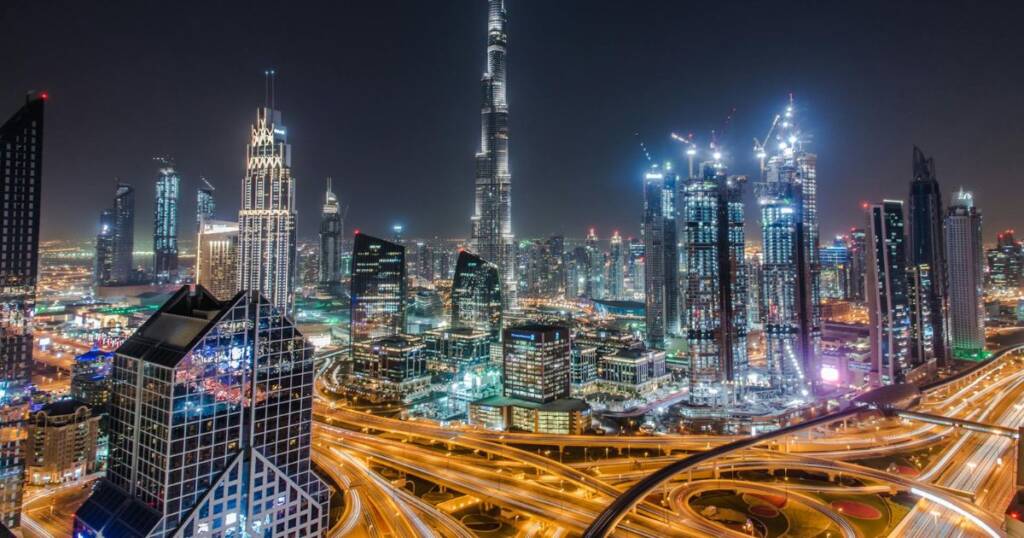
Well – it is easy to drive in Dubai – but it does take a bit of planning and preparation. Major roads are well signposted, and the city’s got a good road network – but you do need to be on the ball, and follow the rules of the road. And of course – if you do get stuck in traffic – just take a deep breath and let other drivers pass. With the right safety measures, some basic knowledge of the road rules, and a bit of common sense – driving in Dubai is a breeze.



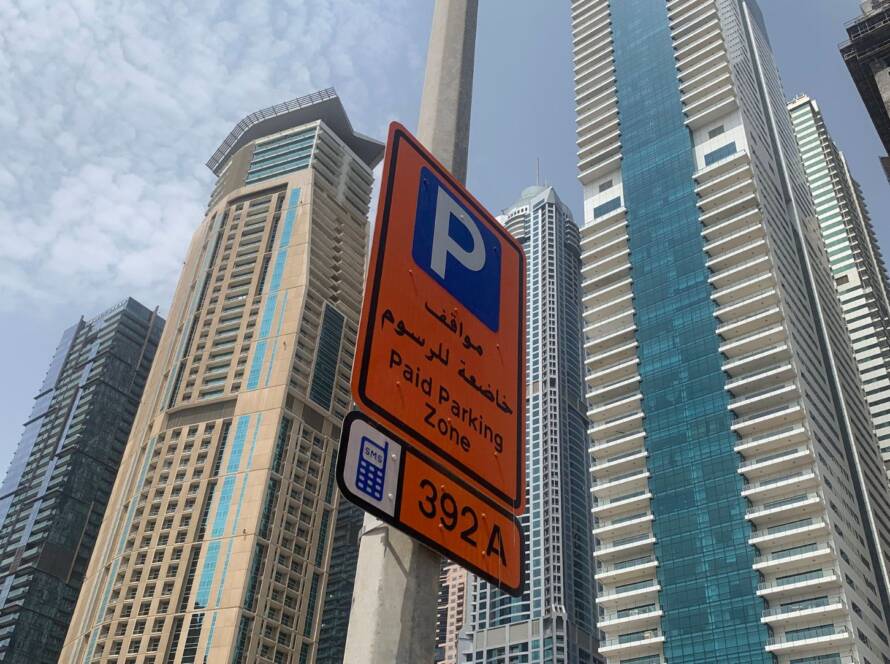
1 Comment